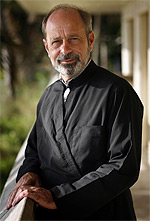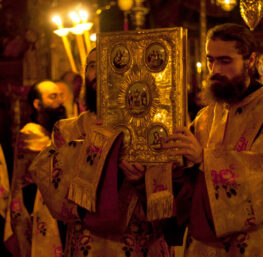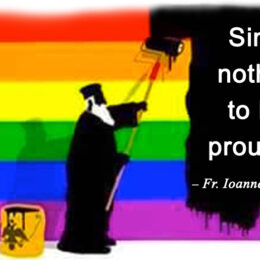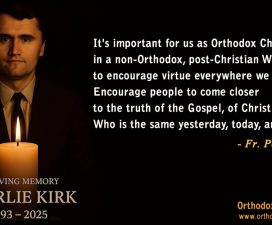
8/11/2010 – Fr. Johannes Jacobse –
I used to preach at the end of the Liturgy.
It was a pragmatic decision. A good portion of my congregation didn’t arrive until after the Gospel reading. The sloppy behavior was ingrained in parish life for decades and wasn’t likely to change soon no matter how strongly I exhorted them to arrive on time. Better to hear the teaching later then never at all I reasoned.
Did some people benefit from the arrangement? Probably. Did it implicitly encourage the sloppy behavior? Most likely. But short of a full-blown renewal in the parish, the late-comers were like to keep on coming in late and what would they remember if I preached earlier? The announcements?
Since moving from a large parish to a mission parish I’ve changed my ways. The sermon is always after the Gospel reading. I used to think that the rubrics required it because the reading was fresh in the minds of my hearers. While this is true, I’m no longer convinced this is the primary reason. I see something new: The timing of the sermon vivifies – breaths life into – the Eucharistic half of the Liturgy.
First a word of explanation. I don’t believe the Gospel is a collection of moralisms or motivational lectures. For that reason the purpose of preaching is not finger wagging (although a sermon can contain reproof) or inspiration (although it can also inspire and encourage). I believe preaching has one function: To bring the Gospel of Jesus Christ to the hearer in the ways that he can understand and comprehend it, and in that understanding and comprehension to be transformed by it.
I believe that the Gospel is the Word of God through the words of the Apostle. The Apostle, the Scripture tells us, receives his Gospel from God. The rest of us receive the Word from the Apostle, which is to say Scripture.
And that Word of God that we hear through the words of the Apostle, is the same Word that spoke the creation into existence at the beginning. He speaks today in order to transform the minds and hearts of men.
It all boils down to this: When the Gospel is preached, Christ is revealed.
“Open the eyes of our understanding that our minds may be illumined by the light of your divine knowledge,”
reads the prayer before the Gospel reading (and all priests should read it).
“Faith comes by hearing, and hearing by the Word of God,” Romans 10:17
wrote the Apostle Paul.
“Preach the word, be ready in season and out of season…” 2 Timothy 4:2
St. Paul exhorted Timothy.
This self-revelation of Christ to the hearer occurs irrespective of the will or desire of the preacher. It occurs only through the faithful preaching of the Gospel. If you teach what the Apostle taught, you are giving your hearer the Word that proceeds from the mouth of God.
I do not believe that the structure of the Liturgy is what vivifies it. We can study it over and over again and admire its poetry, theological comprehensiveness, thematic unity, aesthetic beauty — all the other elements that shape it, but in the end what gives it life is when the words of worship are heard and penetrate the mind and heart.
Studying is good and necessary, but fruitless if our ears don’t hear. Hearing the Gospel in other words, comes first. Stepping into Liturgy – into the true of worship of the God of proclaimed in the Scripture — is a necessarily derived from the first. The words of the Liturgy are truth, but its truth is only comprehended by first encountering Him who is Truth.
The timing of the sermon then draws on more than the simple practicality I presumed for so many years. The sermon takes place when it does because — in conjunction with the reading of the Gospel — it opens the door to concrete and existential communion at the table of the Christ who is revealed through the preaching just moments before. His presence vivifies the Liturgy, and His presence is invoked through the preaching.
How, then, should we preach? With bedrock simplicity. Teach your people what the Gospel says. Draw on practical experience only in ways that illustrate the one or two, or at most, three points you are drawing from the Gospel that day.
Do your homework. Study and pray. In fact, read next Sunday’s Gospel on the Monday before. That way you can ruminate on it all week.
Then, if you are faithful, you bring your people closer to Christ by bringing Christ closer to them.




In our parish we always used to have the sermon after the gospel, and then a new priest came and changed it.
Now we have another priest who changed it back. But the bishop sends out a printed sermon each Sunday as well, and that is read while the priest and deacon are doing the ablutions after communion.
Because some people tend to go to church late, I suggest that priests deliver their sermons no later than one-half hour after church services begin. Consequently, anyone who goes to church more than one-half hour after services begin will miss the sermon.
I have seen this “early sermon” have a positive effect in influencing most worshipers to be in church in time to hear the sermon. Of course, there will always be a few worshipers who will go to church very late, regardless of when the sermon is presented.